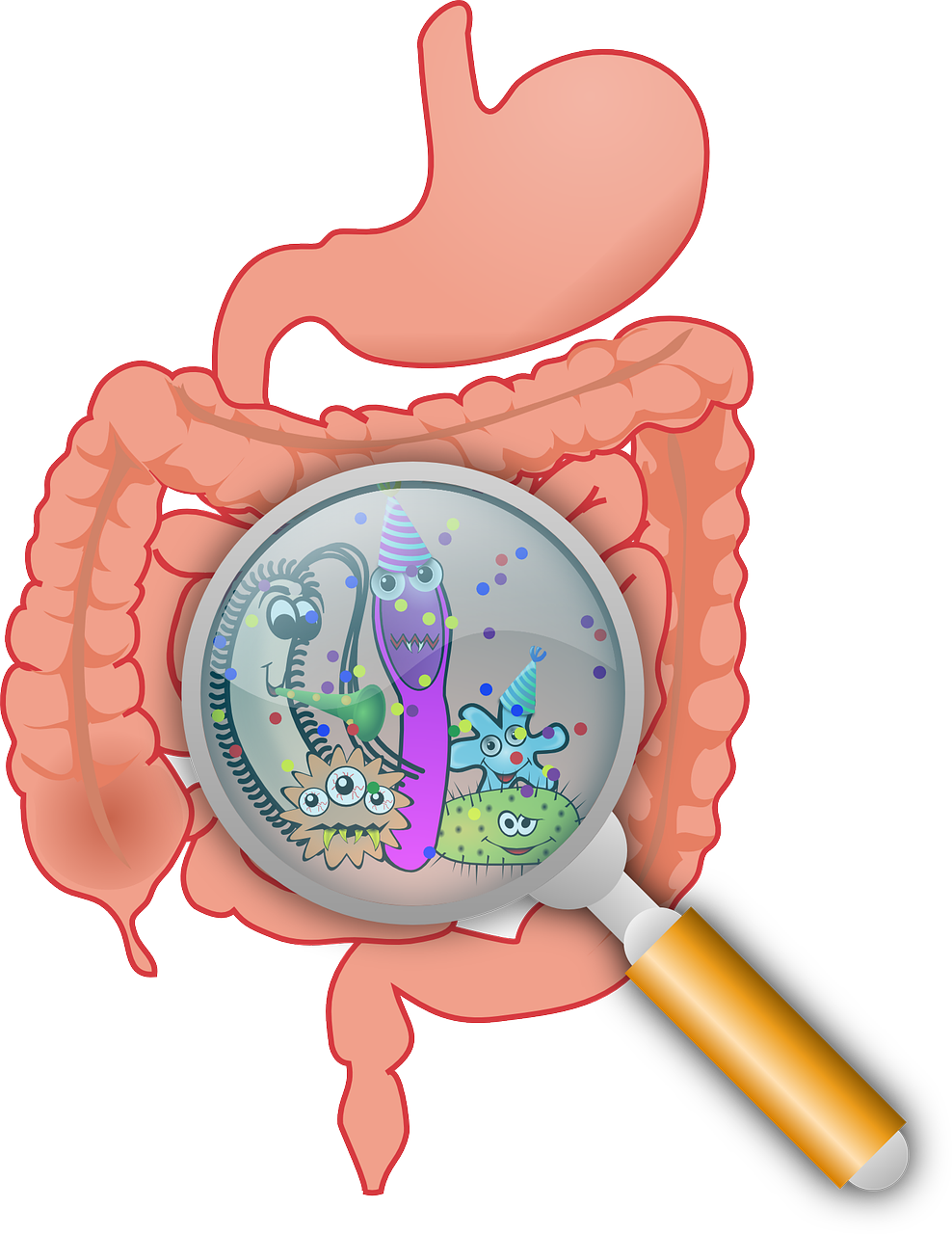Gut-brain axis: the key to a happy life
Ever heard of the gut-brain axis? If you've been following gut science in these past years, you probably have. Researchers are becoming aware of the involvement of gut microbiota in many more processes within our body than we have ever imagined. I am very familiar with the importance that 38 trillion bacteria have in the digestive tract (since most of our microbiome is found here), but I wondered if they also have implications in other parts of our body.
Does gut microbiota impact the brain? Or can our brain modulate the gut bacteria? I know when I feel stressed… I need to run to the toilet, and whenever I am worried, I don’t go. So, there are receptors in the gut that trigger muscle contractions when we are in these different mental states. Maybe bacteria could also communicate with the brain cells via similar mechanisms, thus regulating different functions and be implicated in mental disorders.
The research I found is pretty exciting. Apparently, the brain and the gut are connected via a network called “the gut-brain axis”. This network facilitates molecular signaling between gut bacteria and the central nervous system (CNS), peripheral nervous system (PNS) and enteric nervous system (ENS). The latter is found in the lining of the digestive tract and can regulate gut motility and composition, independently of the CNS.1
Germ-free mice
One great tool scientists use are germ-free (GF) mice, which are not colonized by bacteria. What this essentially means is that we can study what the differences are between mice with and without microbiome.2 In terms of neurological implications, GF mice lack neuro-metabolites, have a lower development of microglia cells (which are found in the brain and are an essential part of the immune system);3 and their blood-brain barrier (BBB) is more permeable. Apparently, bacteria can also influence memory: GF mice show similar stress-induced memory dysfunction as mice with bacterial infections. Furthermore, this memory dysfunction can be prevented with probiotic treatment.4
A very fun fact is that 90% of the body's serotonin (5-HT) is found along the digestive tract!5 Interestingly, serotonin levels are lower in GF mice,6 which means that the gut microbiota may regulate peripheral serotonin levels.7
Subscribe to our blog, get notified when we release a new post and receive a shopping list to heal your gut for free!
How Does The Microbiota Communicate With The Brain?
Gut bacteria can communicate in several ways:
 Nervous system: via the vagus nerve. This is a part of the parasympathetic nervous system ("rest and digest") that plays a role in getting information about the digestive tract and other organs to the CNS.4 Studies have demonstrated that the vagus nerve modulates the relationship between bacterial communities and emotion, cognition and behaviour.14 How? Nutrients and metabolites (SCFAs, secondary bile acids, serotonin, norepinephrine, dopamine, Y-aminobutyric acid (GABA) and tryptophan) excreted by bacteria can be sensed by specific cells found in the gut, called enteroendocrine cells (EECs). These cells, in turn, communicate with the brain via the vagus nerve by releasing neurotransmitters. This transmission occurs very fast, thus the brain is capable of receiving the signal, for example, of ingested food in milliseconds.14, 15 This is also the mechanism by which bacteria can modulate serotonin production.16
Nervous system: via the vagus nerve. This is a part of the parasympathetic nervous system ("rest and digest") that plays a role in getting information about the digestive tract and other organs to the CNS.4 Studies have demonstrated that the vagus nerve modulates the relationship between bacterial communities and emotion, cognition and behaviour.14 How? Nutrients and metabolites (SCFAs, secondary bile acids, serotonin, norepinephrine, dopamine, Y-aminobutyric acid (GABA) and tryptophan) excreted by bacteria can be sensed by specific cells found in the gut, called enteroendocrine cells (EECs). These cells, in turn, communicate with the brain via the vagus nerve by releasing neurotransmitters. This transmission occurs very fast, thus the brain is capable of receiving the signal, for example, of ingested food in milliseconds.14, 15 This is also the mechanism by which bacteria can modulate serotonin production.16
 Immune system: overgrowth of pathogenic bacteria can lead to increased permeability of the gut and blood-brain barriers, incrementing microbial infiltration and therefore, causing inflammation. Chronic inflammation can influence the function of the CNS and lead to neurological disorders.17, 18
Immune system: overgrowth of pathogenic bacteria can lead to increased permeability of the gut and blood-brain barriers, incrementing microbial infiltration and therefore, causing inflammation. Chronic inflammation can influence the function of the CNS and lead to neurological disorders.17, 18
 Endocrine system: by the release of peptides in the intestine that modulate hormones.4
Endocrine system: by the release of peptides in the intestine that modulate hormones.4
How Does The Brain Modulate Gut Bacteria?
One of the factors that cause rapid changes in gut microbiota is stress. Social stressors for as little as 2h can already change microbiota composition.19 Even maternal stress can cause an altered infant microbiome associated with a more inflammatory state.20
The brain (ENS) can affect the function of the gut microbiota by:
- Changing gut motility, intestinal transit and secretion.
- Modulating gut permeability.
- Secreting hormones that directly change microbial gene expression.
- Producing antimicrobial peptides, mucus and gastric acid which kill bacteria.
- Inducing mucosal immune responses to contain bacteria within the lumen and away from the gut lining.15
Microbiota In Depression And Anxiety
Behavioural and emotional traits can be modulated by gut microbiota. That's right, research suggests that bacteria may also be involved in how you feel.
Starting with animal studies, when microbiota from anxious mice was introduced in sociable mice, resulted in mice becoming less social and stressed. And the reverse was also true.8, 9, 10 Moreover, mice that were colonized with faecal human microbiota obtained from patients with major depressive disorder (MDD) showed depressive-like symptoms.22
It is thought that dysbiosis (alteration of the normal gut microbiota) may affect the communication between the ENS and CNS, leading to inflammation, alteration of intestinal permeability and augmented response to stress. High cortisol levels, which are typical of stress, favour anxiety and depression.21 Studies have shown that when colitis (inflammation of the colon) was induced in rodents, they became more anxious11 and depressed.12 Since beneficial gut bacteria are reduced in colitis, it is thought that beneficial gut bacteria may be involved in these emotions.
Pre- and probiotics (Lactobacillus and Bifidobacterium) were also able to decrease anxiety behaviours in animal models,23, 24, 25 as well as alter gene expression in neurons that may be involved in emotion regulation.13
For humans, it has been reported significant differences in gut microbiota composition between healthy and depressed patients.4 For example, Bifidobacterium and Lactobacillus are reduced in patients with major depressive disorder (MDD).26 Also, there are some small clinical trials where probiotics have shown to improve self-reported feelings of depression, anxiety and sadness.27, 28
Two metabolites important in this disease:
- GABA is an amino acid produced naturally in the brain, which functions as a neurotransmitter, facilitating communication between brain cells. Its role in the body is to reduce the activity of the neurons and CNS, therefore increasing relaxation and reducing stress. Studies have shown that low levels of GABA correlate to increased depression and anxiety.29 Interestingly, bacteria such as Bacteroides, Parabacteroides and Escherichia species produce high amounts of GABA. One study in humans found that levels of faecal Bacteroides were correlated with less depressive symptoms.30 And if this wasn't enough, mice fed with probiotics showed changes in GABA levels, in the same region and way as anti-depressants do.31
- Brain-derived neurotrophic factor (BDNF) levels in humans with depression and anxiety seem to be lower. On the same line, mice studies show that having an abundance of pathogenic bacteria decrease BDNF levels, which is related to depression and anxiety-like behaviours.32 Furthermore, one study in rats showed that BDNF levels were increased after prebiotic intake.33

Microbiota In Autism
Research suggests that autism symptoms may be related to an altered gut microbiota, low levels of Bifidobacterium and higher levels of Lactobacillus, and increased pro-inflammatory markers.34 Moreover, gastrointestinal issues are often occurring in autism patients, which are also correlated to a dysbiosis in the gut bacteria.35
When a probiotic (Bacteroides fragilis) was administered to an animal model for autism, mice experimented a reduction in autistic behaviour. This is thought to happen due to an improvement of gut integrity and modulation of pro-inflammatory cytokines.36
What about probiotics in human trials? Two studies done on autistic children showed that probiotic supplementation improved gastrointestinal and autistic symptoms.37, 38
Microbiota In Alzheimer's disease
Microbiota seems to be involved in amyloid plaque formation. This idea comes with the observation that GF mice show lower levels of amyloid-beta.39 A recent in vivo study indicated that probiotic supplementation could modulate gut microbiota, leading to high gut hormones ghrelin and leptin, which decrease amyloid-beta deposits on mice. These mice also had lower levels of pro-inflammatory cytokines in plasma, which may help in delaying disease progression.40
In humans, bacteria obtained from faecal samples seem to differ between Alzheimer’s patients and healthy individuals.41 Also, it has been reported that patients have high levels of blood LPS (a molecule found in the membrane of Gram-negative bacteria). This molecule is recognized by immune cells and evokes inflammation, which in turn, contribute to injury in neurons and increased amyloid-beta production.42
Microbiota In Parkinson's disease
Gut microbiota in Parkinson’s patients also seems to differ from healthy individuals. Faecal samples from patients present lower levels of Prevotellaceae and SCFAs. These have been shown to be important for the neurons and production of compounds such as dopamine.43 Moreover, similar to other disorders, most of these patients report digestive issues and have increased intestinal permeability.44
Subscribe to our blog, get notified when we release a new post and receive a shopping list to heal your gut for free!
Conclusions
There is considerable evidence that links the gut microbiome to the normal development and function of the nervous system, and to its implication in diseases involving the gut and nervous system.
Overall, pre- and probiotics have been shown to improve disease-related symptoms, both in animal and human studies. It is still not clear whether the benefits are related to changes in gut microbiota's composition, or due to changes of their behaviour.45
Tips to achieve a happy microbiome:
- Consume at least 100 g/mL per day of fermented foods. It is even better if you consume two different types of probiotic food a day.
- Eat more fruits, vegetables, whole grains, legumes, nuts and seeds. Basically, 80% of your foods should come from a whole-food plant-based diet. These types of foods are of great nutritional value and full of antioxidants. They also reduce overall inflammation in the body.
- Eat more fiber and increase it slowly. If you increase too fast, there is a big change you will be bloated from it. Your gut microbiota is not used to such large amounts of fiber and it will sit in your intestine for a long time. Aim for 35-50 grams a day.
- Include more Omega-3 foods. The recommended dose is 250-500 mg EPA/DHA per day. Eat more flaxseeds, chia seeds, walnuts and algae.
- Exercise regularly. This helps to have regular bowel movements and also affects the gut microbiota.
- Work on your stress levels. Research says that stress greatly affects the microbiome.19 There are several things you can try: meditation, go for a walk, yoga or read a book.
